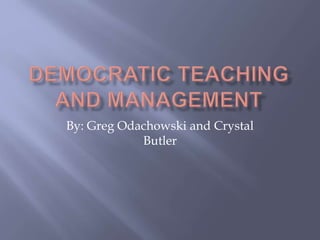
Democratic teaching and management
- 1. By: Greg Odachowski and Crystal Butler
- 2. Austrian Born, February 8, 1897 Trained at the University of Vienna, received is MD in psychiatry in 1923 Immigrated to the United States in 1937 American Educator and Psychologist
- 3. Dreikurs developed Alfred Alders system of individual psychology into a method for understanding children's behavior. His theory is based on the premise that children have an inherent desire to belong and feel part of their peer group, but due to feelings of inferiority and maladaptive parenting, they have acquired ineffective ways of finding their place.
- 4. Human beings are social and have a basic motivation to belong Childhood behavioral problems stem from a lack of feeling, or feeling inadequate in their social group. Behavior is a result of individual purpose Education starts from home, and the education system branches from it. Behavior is not an action, but a reaction and interpretation of the surrounding environment.
- 7. Attention Getting-If a child is not getting desired attention from peers and students misbehavior may begin to occur. When a teacher begins to feel annoyed, he or she can be sure the child is seeking attention. Power/Control- Students begin to take control because they feel it gets them the attention they deserve. When the teacher feels intimidated or beaten then the child is seeking control.
- 8. Revenge- Students retaliate often from anger because they did not receive the attention or control they desired. A teacher can identify revenge when he or she feels hurt. Inadequacy/Helpless ness- Students may just give up when they do not feel apart of the group. A teacher may feel incapable, or helpless as well when a student feels inadequate.
- 9. Seeking Attention – Restlessness, chattering, talking out of turn, throwing things, minor mischief. Seeking Power – Refuses to do homework, refuses to sit down, purposely misspells words. Seeking Revenge – Similar to power seeking misbehavior but often times it’s more extreme, like verbally assaulting a teacher. Displaying Inadequacy – Has a defeatist attitude, often underachieves as a way to get attention.
- 10. Driekurs did not believe in reinforcement, neither reward or punishment He believed in natural and logical consequences, he believed these can be used to prevent problems.
- 11. Being sent to bed early because of falling asleep in class. Cleaning the desk after drawing on the desk.
- 12. The Democratic Teaching Method is based on the democratic principles of equality, cooperation, participation and mutual respect. The teacher’s attitude toward the class must have a combination of firmness and kindness. Firmness implies self-respect and kindness implies respect for others. If a teacher is too firm they will create resistance and if the teacher is too kind, the students will walk all over them. When the teacher can achieve a balance between the two, mutual respect will be gained and there will be far less conflict.
- 13. When dealing with misbehavior, it is important to remember this idea of mutual respect between the teacher and the student. Being an autocratic teacher, one with harsh, illogical punishments, one that rules with an iron fist, this will often times only create more resistance. A democratic solution to misbehavior is to get together with the student and put the ball in their court, ask them how “we” can fix this problem, and let them come up with their own solutions. Guide them rather than tell them.
- 14. For example, if they repeatedly “forget” to do their homework, meet with the student and say: “lets brainstorm, what are some ways that “we” can think of to ensure that you don’t forget your homework again”. By guiding them to come up with their own solution rather than telling them, it gives them a sense of responsibility and it makes them feel like it was their idea, making it much more likely that they will follow through on correcting their misbehavior.
- 15. The teacher’s overall goal is to make their students feel like they belong in the class. They do this by: Eliminating any feelings of inferiority or inadequacy through encouragement, highlighting a student’s strengths, and by promoting participation by all. Giving them a sense of equality, like they have a say in how the class is run. Maybe by having a class meeting for deciding upon the order in which they will learn each chapter from their book.
- 16. Less time wasted on disciplining students. The idea of mutual respect between student and teacher creates mutual trust and a bond to build off of, further limiting any potential future discipline problems. Encouraging students to come up with solutions to their own problems gives them a sense of self-worth, responsibility and also helps create self-discipline.
- 17. Not all teachers have the temperament to restrain their initial reaction to a student’s misbehavior and will come off as autocratic rather than democratic, which can ruin any mutual respect that had been gained. It can be more difficult to institute this method with older students since they are already set in their ways. Combative, violent, and overly difficult students may not always respond to this method, and other methods may need to be included on a trial and error basis.